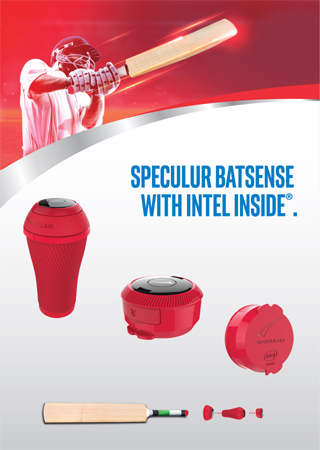
Intel technologies unleash new insights and fan experiences for cricket at the ICC Champions Trophy 2017

At the International Cricket Council (ICC) Champions Trophy, Intel executives took the stage to share new innovations Intel is bringing to the tournament. These include advanced pitch analysis by an Intel drone, profiling the bat swing using a bat sensor powered by an Intel® Curie™ module, and bringing a cricket VR experience to the fans at the stadiums. These technologies will be showcased at the ICC Champions Trophy in the UK, starting June 1, and will help enhance the tournament experience for fans, players and broadcasters using data, analytics and visualization.
“We couldn’t be more excited to have Intel as our Official Innovation Partner of the ICC Champions Trophy 2017,” said David Richardson, CEO of the ICC. “The innovations Intel is bringing to the game promise to transform how cricket is experienced and enjoyed around the world, and we look forward to partnering with Intel in this effort.”
Intel Sports Group Vice President Sandra Lopez highlighted the role of technology in transforming the way we play and view sports. With higher levels of digitization, Intel is in a unique position to enable the sports industry to capture and analyze data to uncover and respond to new insights in real time. “Our goal is to lead the way forward into the digitization and personalization of sports, transforming the way fans and athletes experience sports,” Lopez added.
Later, Anuj Dua, director of marketing for Intel’s New Technology Group, detailed the innovations Intel is bringing to the current edition of Champions Trophy.
Drones
In a first at the Champions Trophy, the Intel® Falcon™ 8 Drone, equipped with HD and infrared cameras will be used for advanced pitch analysis before every match. Images captured by the drone will offer rich visual data on pitch conditions such as grass cover, grass health, and topology, which will be used to generate daily pitch reports leveraged by commentators during broadcasts.
Bat Sensor
During his presentation, Dua also introduced a new bat sensor powered by the Intel Curie technology that can be mounted on any cricket bat to generate data for every stroke that the batsman plays. With this technology, parameters like back-lift, bat speed and follow-through can be tracked for every cricket stroke. Several batsmen will use these bat sensors in the games at the 2017 Champions Trophy, enabling new insights on stroke play and rich story-telling in broadcast.
Speculur Managing Director Atul Srivastava added, “Speculur BatSense with Intel Inside has the potential to transform cricket across a varied audience from coaches to aspiring self-taught cricketers.Coaches can use their insights and expertise along with the bat sensor data to make specific adjustments to a batsman’s technique ultimately helping him perform better.”
Speculur also announced plans to bring this technology to consumers later in the year. With Speculur BatSense, hundreds of thousands of young and aspiring cricketers will soon be able to measure, track and improve their batting skills. Speculur plans to make Speculur BatSense with Intel Inside available in Australia, India, the United States and the UK in the second half of 2017.
Former English Captain turned commentator, Nasser Hussain who joined Dua on stage stressed that technology has and will continue to positively impact cricket in a lot of ways. Player performance, Game strategy, adjudication and fan experiences will all change with the introduction of new technologies to the sport.
Virtual Reality
Intel is also showcasing innovative experiences for in-stadium fans. Virtual Reality (VR) experience zones at The Oval and Edgbaston will allow fans to experience facing a virtual bowler in an immersive cricketing environment. Using a head mounted display (HMD), the player will be able to test his or her batting skill against a virtual bowler. Using the Intel Curie technology enabled cricket bat, the player will be able to see data from their swing such as bat speed and back-lift angle as well as a simulated score from the VR session.
